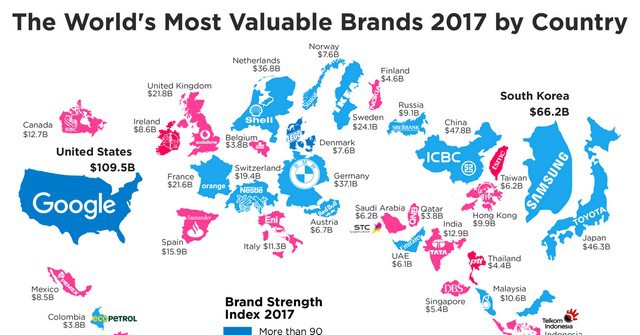Brand strength is a measurement of how well your brand communicates your value to your customers. It’s determined by the level of trust, loyalty, and awareness that customers have towards your brand. This can be measured through customer satisfaction surveys, social media engagement, and sales figures.
Brand strength is important because it can influence your bottom line. A strong brand will increase your customer base, which in turn increases sales and profits. But what exactly does a strong brand look like? And how do you go about measuring and building brand strategy and strength? Let’s explore these questions next.
Table of Contents
What is Brand Strength (or Brand Equity)?
A brand strength, closely related to Brand Equity, is the value that is carried by a brand. It’s essentially a marketing term that denotes the perception of consumers towards the brand or the value invested in it over a period of time.
Though the definition usually varies across organizations, some would like to term Brand Equity as the premium that a company charges because of the reputation and name that it enjoys because of constantly delivering good products that are remembered.
When consumers have high respect for a brand, think positive about the quality and price, the company enjoys a positive brand strength and brand growth. If consumers have a negative opinion about a brand and if the brand constantly under-delivers as per expectations, it has a negative brand strength.
A positive brand strength is always profitable for an organization because it allows the company to charge the premium for their products or services in comparison to generic brand pricing used by not-so-differentiated products or services. It gives leeway in many other aspects too.
Example, a company that enjoys a strong brand equity can also transfer its equity on a certain product to other products in its product line extensions and therefore premium revenue streams for its other products too.
Another Example of positive and strong brand positioning is Apple which launched its first ever iPhone in the market and its success created positive brand equity for the company. Over a period of time, it has smarty leveraged its brand equity to other products as well include iPads, iPod, etc. that have premium pricing.
Similarly, it can help boost the stock price of a company too by creating ripples in the stock market and positive sentiments in the minds of investors. Moreover, it also raises the valuation of the business that ultimately leads to higher market share. Positive brand strength is always driven by the consumer and the different perceptions that they place on the product.
An example of strong brands strength could be that of Gucci, Italian luxury brand of fashion and leather goods. Gucci enjoys positive brand equity because it offers exclusivity of its fashion wear and operates in a very niche market. It pushes premium pricing because of the exclusivity of its stores too as it has very few stores, creating a consumer perception that it’s an exclusive brand. A negative brand strength, on the other hand, is extremely disastrous for a company as it can tarnish the reputation and lead to bankruptcy.
Why is Brand Strength Important For Your Business?
Brand Strength is Important for Your Business because it gives you control over your product and customer experience.
Brand strength also increases customer loyalty, which means that customers are more likely to keep coming back, and less likely to seek similar products elsewhere.
This can be especially helpful when you’re developing a new product or service, as it can help you establish credibility in the market, build a loyal following, and increase the market share.
Brand strength also helps you build a competitive advantage over other companies in your industry. This is because it gives you control over the customer experience, which means that you can use your brand to differentiate yourself from your competitors and increase your brand’s performance.
You can also use brand strength to create an emotional connection between your customers and their experience with your product or service.
Brand Equity develops over a period of time and is never a success over a night. It determines the emotional attachment consumers place the product. One can easily determine the equity by listening to what consumers speak about. Example, if 2 people, having different perceptions, still talk positive about the price and quality, it is affirmative that the company enjoys a favorable brand performance in the minds of consumers. There are many factors that contribute towards the brand strength index and those are mentioned below.
How to Measure Brand Strength?
Brand strength is the perception of a brand’s worth and utility. It is a measure of how likely customers are to buy from a company, and how willing they are to recommend it to others. Brand strength is important because it drives sales. A strong brand can help your business grow, while a weak brand can hurt it.
To measure brand strength with the brand assessment model, there are several ways:
1) Customer Satisfaction Surveys
This is an important way to measure brand strength because it gives customers’ opinions about your company and products.
You can ask questions about things like whether or not they would recommend your services/products to their friends or family members, or whether or not they would be willing to pay more for those services/products in the future.
2) Net Promoter Score (NPS)
The NPS measures customer loyalty by asking customers one simple question: “How likely are you to recommend [company name]?” The responses to this question are used to calculate an NPS score that indicates how likely people are to recommend your business over time — which means it also shows how strong your brand really is!
Factors that Contribute to Brand Strength
1) Brand Perception
Brand perception usually takes into account consumer’s perception towards the quality of a product. This perception is actually relative. A consumer usually relates the performance and overall quality of a product to his or her own utility and then compares it with similar product lines in the market or with competitor products. Therefore, quality is usually a perceptual factor and cannot be generalized to all consumers.
2) Brand Awareness
Brand awareness is important to the health of a company because it determines the Mindshare that consumers have towards the product. Example, if a consumer wants to buy a mobile phone and the first brand that comes to the mind is Xiaomi, then there is a positive MindShare. Similarly, if a consumer could think of Xiaomi in most of his purchases, it simply means that the brand awareness is positive. The advantage of this is that it allows the company to create demand in the market.
3) Brand Loyalty
A strong brand Strength also speaks largely of the brand loyalty that consumers have towards the product. Consumers who love the product or service and have an emotional attachment to it, would repeatedly buy the product and are termed as loyal brand ambassadors. This creates wallet share for the company and increased the brand equity too.
4) Brand Association
Brand Association is technically not the benefits offered by the company or is not tangible, but is rather deep-rooted in the minds of consumers. Example, Four Seasons Hotel, one of the world’s largest luxury hotels is immediately associated with luxury, comfort, and quality of service. It creates a positive brand association in the minds of consumers. Positive brand associations are good for creating a positive brand equity and is only possible if the product or services offered by the company is desirable and satisfies the needs of the consumer.
It’s not a one-day effort that organizations can create a positive impact towards it brand value. It’s a constant process that builds over time. A company can create positive brand equity by introducing a quality product in the market that is cannot be easily replicated, constantly monitoring competitor moves and market changes, brand building a personal connection with consumers, having a consistent brand message, and most importantly by capturing consumer feedback.
This allows a company to constantly change its product offerings and also gives an impression that it seriously takes consumer feedback for improvements. Many companies do reinforce brand image and brand management by changing their marketing strategy. Example, Pepsi, and Coca-Cola do change their marketing advertisements on a constant basis to reinforce brand association and to capture mindshare.
4 Ways to Build A Strong Brand
You can build a strong brand in many ways:
1. Create an emotional connection with customers by showing them why your product or service is valuable in their life. This is known as ‘brand engagement’ and it’s one of the most important aspects of brand building.
2. Use consistent messaging and brand tracking across all your marketing channels (website, social media profiles, advertising etc.) so that people know what they’re getting when they hear or see your brand name or logo.
3. Build trust by being honest in everything you do (make sure you’re not lying about anything) and always delivering on promises made to customers (such as delivery times).
4. Showcase customer testimonials/reviews which highlight how people feel about using your product or service – this helps build credibility and trust in your company or brand.
Liked this post? Check out the complete series on Branding

